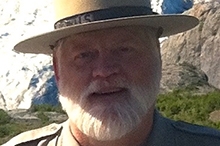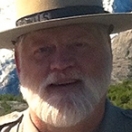

John Morris is being honored as a Climate Education and Literacy Champion of Change.
For as long as I can remember, I’ve wanted to be a park ranger. Growing up, my family spent most of its summer weekends camping and hiking in our National Parks. I’ve always valued both the lessons I learned there, and the sheer privilege of being able to have such enriching experiences.
Parks are places in our country that not only protect our natural history, they tell the stories of people and events that create our national heritage. They not only preserve our past, they foretell our future. So what are the future people or events that will continue to define our heritage? How society faces climate change will surely be one of them.
A changing climate will have a lot to do with our heritage, and parks make wonderful living laboratories. Parks provide opportunities to gain vision, not only vision about the environment, but vision about the future. We enjoy the parks, but we can also use them to understand nature and to appreciate civilization. To effectively manage our parks (to manage our lives, really), the best results occur when we come together and choose a vision about what it is that we collectively want. Parks were envisioned for everyone, so their vision has to be shared by everyone.
Our task as interpreters and educators is to raise awareness about what’s occurring and changing in the world around us, especially when it’s resulting from our collective lifestyle. At the National Park Service, we have explored several possible scenarios that climate change is bringing, to discover ways to respond that have feasible and effective outcomes. We have rehearsed how to cope with them before they actually happen. Similarly, by informing citizens and helping them engage in finding solutions rather than finding blame, we have helped dispel some of the controversy that can be a distraction today. There are many solutions already available that we can advance together.
I believe we must also learn and use the power of collaboration and frequent communication along the way. Working closely with others can be a hard and sometimes painful process of confronting controversy or facing failings in ourselves and others, but it is a critical part of the educational effort. Shared mistakes can be empowering, as can acceptance of our shortcomings. When we share the effort, we not only learn about the impacts and implications of climate change, we also learn about each other and ourselves, and about the creative capacity we have to overcome difficulties. As a park interpreter, I’m proud to have been a part of all of it.
We are on the early steps of a long journey. It may take several decades or more to fully respond to our changing climate. Our community in the future will likely be very different from today’s. I believe we can and will navigate that transformation. Ultimately, we must learn to create energy differently and use it more efficiently, and I suspect those changes will come mostly from individual choices and new lifestyles, from decisions made by ordinary people in their daily routines. As educators and interpreters, that puts the responsibility right on our shoulders. We are the honest brokers for the best science, the best ideas and the latest innovations, and the best of humanity to respond. It’s by sharing our hopes, with enthusiasm and passion, that we’ll eventually find success. What could be more important, or fun - sounds like a pretty good heritage, after all!
John Morris is a recently retired Interpretive Ranger with the National Park Service in Alaska.


